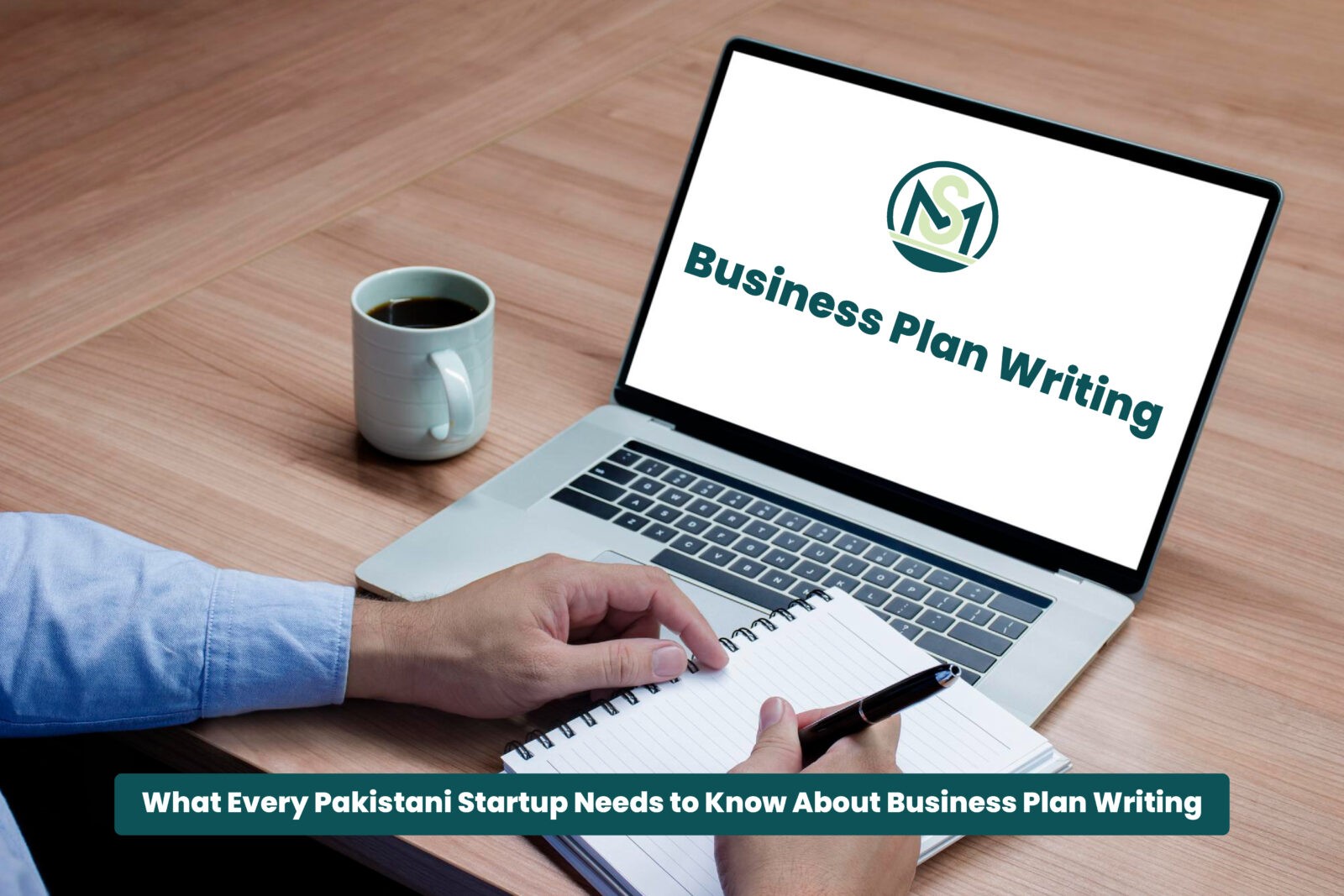Launching a startup in Pakistan isn’t just brave; it’s a rollercoaster.
You’ve got the idea. Perhaps even passion, a strong team, and a prototype. However, when it comes to writing the one document that every investor, bank, or serious partner asks for —the business plan —you either freeze or fumble.
You’re not alone. Most Pakistani startup founders know their product inside out, but when it’s time to turn that vision into a solid, written plan, they struggle.
This article is your real-world guide to business plan writing for Pakistan’s market, no jargon, no fluff. Just honest, practical advice that speaks your language, with everything a Pakistani startup needs to build a plan that gets taken seriously.
Why a Business Plan Still Matters (Even in a WhatsApp World)?
We get it. You’re running lean. Things move fast. Who has time to sit and write a formal document when you’re already trying to juggle sales, code, and sanity?
But here’s the truth:
A good business plan is not a formality. It’s your first pitch, your map, and
your lifeline when things get chaotic.
It helps you:
- Think clearly about your goals.
- Avoid random, expensive decisions.
- Show investors you understand your business.
- Align your team (and your head)
- Get one step closer to funding.
No matter what stage you’re in, writing a business plan in Pakistan means you’re taking your dream seriously.
Reality of Running a Pakistani Startup
Being a startup founder in Pakistan is no easy task. You’re navigating:
- Price-sensitive customers
- Load-shedding and internet issues
- Ever-changing tax rules
- Lack of easy funding
- And sometimes, a market that’s just not ready yet
That’s why business plan writing for Pakistan’s market can’t follow international templates. You need a document that speaks to our investors, our customers, and our economic reality.
So What Goes into a Great Startup Business Plan?
Think of it like a good story. Your business plan should take readers from the “big idea” to the “here’s how we’ll make money doing it.”
Here’s what to include and how to say it in a way that makes people listen.
1. Start with a Hook (Executive Summary)
The executive summary is your first impression. Investors won’t read 20 pages if the first one doesn’t grab them.
Answer this in a punchy paragraph:
- What’s the problem in Pakistan you’re solving?
- How are you solving it?
- What makes your solution better than the rest?
- What do you need to grow?
Don’t say, “We’re an Uber for XYZ.” Say: “We’re helping 3 million middle-income families in Pakistan find affordable tutoring on their phones, in Urdu, without needing Wi-Fi.”
2. Tell Your Story (Company Overview)
- What inspired your startup journey?
- What have you done so far?
- What’s your big-picture vision?
If your Pakistani startup came from a real pain you saw, say it. That personal angle builds trust. Investors bet on people, not just products.
3. Prove There’s a Market (Local Research = Your Weapon)
Don’t say, “The market is huge.”
Demonstrate how your idea addresses a genuine local need.
Use local stats. Reference surveys, Facebook group insights, or even your customer interviews. Your startup business plan should answer the following:
- Who exactly is your customer?
- How do they behave, buy, and think?
- Who else is already serving them (and failing)?
“We surveyed 200 mothers in Lahore. 78% said they’d prefer an
Urdu-language health app with women doctors.”
Now that’s believable.
4. Show What You’re Selling (Product or Service Breakdown)
- What’s your offering?
- How does it work?
- What makes it better than what’s already out there?
If it’s a mobile app, show the screenshots.
If it’s a handmade product, show the process.
If it’s a B2B service, show how it saves time or money.
Use everyday language. Don’t say “scalable SaaS platform.” Say, “a software that helps small retailers in Pakistan track their sales without needing Excel.”
5. Go-To-Market Plan (How Will You Get Customers?)
Please tell us how you’ll grab attention in a crowded, distracted market.
- WhatsApp groups?
- Daraz launches?
- TikTok influencers in Urdu?
- On-ground stalls at Sunday markets?
Your Pakistani startup has to think like a local, not like a Silicon Valley clone.
6. Let’s Talk Money (Your Financial Plan)
Ah, the scary part. But here’s the thing:
Your financial plan for a startup business doesn’t have to be perfect. It has to be real.
- Project your revenue, expenses, and profits for 1–3 years
- Include startup costs (website, rent, licenses, salaries)
- Be honest about your burn rate (how much you’re spending monthly)
- Show when you’ll break even
And yes, add both a best-case and worst-case scenario. Pakistani investors appreciate realistic numbers over big promises.
7. Your Dream Team (Who’s Behind This?)
Investors don’t just back ideas. They back people.
So, show off your team:
- Their skills, experience, and roles
- How well do you work together?
- Who do you still need to hire?
Even if it’s just you and your cousin working from a basement, own it. Say what you’re good at and what support you’re looking for.
8. The Ask (Let’s Talk Investment)
Now you tell them what you need.
- How much are you raising?
- What will you use it for?
- What’s your expected return on Investment?
“We’re raising PKR 15 million to launch in three cities, hire two developers, and run a targeted influencer campaign for 6 months.”
That’s better than three pages of vague hopes.
Mistakes That Kill Pakistani Startup Plans (Don’t Make These)
❌ Copying foreign templates word-for-word
❌ Using words you don’t even understand
❌ Skipping the financials
❌ Writing only in English without cultural relevance
❌ Hiding your challenges instead of addressing them
Pakistani investors, banks, and even grant providers want to see that you’ve thought things through, not that you’ve made everything sound perfect.
What Makes a Business Plan Work in Pakistan?
Here’s your simple checklist:
✅ Speaks clearly, no buzzwords
✅ Reflects local reality (not Western assumptions)
✅ Proves there’s demand with local insights
✅ Balances vision with numbers
✅ It feels like someone who cares wrote it.
Where to Find Good Templates for Pakistani Startups?
Not sure how to start? Use:
Free guides from NIC Pakistan, Plan9, or Startup.pk
Templates from LivePlan or Canva Docs
Mentorship from local incubators or business consultants
And always tailor it to your audience. Don’t write like a Silicon Valley founder. Write like someone who understands the streets of Lahore, the users of Karachi, and the realities of running a business in Pakistan.
Plan Isn’t Just for Investors, It’s for You
Most founders think a business plan is something you write to raise money.
But really? It’s for you.
It forces you to slow down, face the numbers, confront your assumptions, and determine where you’re headed.
If you’re a Pakistani startup, this isn’t just a nice-to-have; it’s your blueprint for survival and growth.
When you have clarity on paper, you’ll pitch better, build faster, and sleep easier.
How MSAFDAR Helps Your Pakistani Startup Build a Winning Business Plan?
At MSAFDAR, we’ve seen it time and time again: founders with brilliant ideas but no clear roadmap. And in Pakistan’s fast-moving (and often unpredictable) business environment, you can’t afford to leave your future to guesswork.
That’s where we come in.
We don’t just help you write a document. We help you build the plan that builds your business.
Here’s how we support your startup from the ground up:
1. Real-World Strategy, Not Just Templates
We don’t hand you a generic Word file and call it a day.
Our team sits with you, virtually or in person, to understand your unique product, market, and challenges. Whether you’re launching a tech app in Karachi or a food delivery service in Peshawar, we customize your business plan for Pakistan’s market, not Silicon Valley.
We ask the right questions, uncover the fundamental gaps, and shape a strategy that makes sense for you.
2. Financial Plans That Make Sense
Numbers can be scary, but they don’t have to be. Our experts build a financial plan for your startup business that’s grounded in reality, not fantasy.
- Revenue projections? We model them based on local pricing and demand.
- Cost breakdown? We help you factor in everything, from UBL transaction fees to JazzCash integration.
- Investor pitch-ready? Always.
We ensure that your plan not only looks credible but is credible as well.
3. Investor-Friendly Plans That Get You Noticed
We know what Pakistani investors want to see and what instantly turns them off.
So we craft your investor-friendly plan to:
- Showcase traction (even if it’s just pilot users)
- Highlight your understanding of the local market.
- Clearly explain where the money will go (no vague “marketing” lines)
We help you speak the language investors understand and trust.
4. Mentorship & Revisions Until It’s Pitch-Perfect
Your first draft won’t be your final draft, and that’s okay.
At MSAFDAR, we don’t just disappear after delivering your business plan. We revise, advise, and help you prep for incubators, pitch days, grant submissions, and even SBP funding programs.
We stay in your corner as you grow.
5. Tailored for Every Stage of Your Startup Journey
- Just starting? We help shape your idea into a clear plan.
- Ready to scale? We build a data-driven growth strategy.
- Looking for funding? We polish your pitch and financials.
Wherever you are, we meet you there with tools that match your vision.
MSAFDAR = Strategy + Simplicity + Support
We’re not just consultants. We’re business people, too.
We understand the highs, the stress, and the profound hope you carry as a Pakistani startup founder.
That’s why every business plan we build isn’t just about impressing investors; it’s about giving you the clarity to lead your business forward confidently.
So, when you’re ready to turn your idea into a scalable, fundable, and sustainable reality, we’re prepared to help.
Let’s build your plan together.
FAQs
Q1: I’m just getting started. Do I still need a business plan?
Yes. Even a simple one-page startup business plan can help you stay focused, attract co-founders, or apply for incubators like NIC or IdeaGist.
Q2: How do I write a business plan in Pakistan that’s not generic?
Focus on local insights, pricing, digital behaviors, and infrastructure gaps. Use Urdu-language examples if needed. Investors here want to see your understanding of this market.
Q3: What does a sound financial plan for a startup business include?
Your revenue model, expected income, costs, burn rate, break-even timeline, and funding needs. Use Excel or Google Sheets to forecast.
Q4: Is there such a thing as an investor-friendly plan?
Yes, and it’s transparent and honest, shows traction (even small), and maps out where their money will go.
Q5: What if I make a mistake in my plan?
That’s okay. A business plan is not written once and done. It’s a living document. Update it, improve it, and let it grow with your business.




